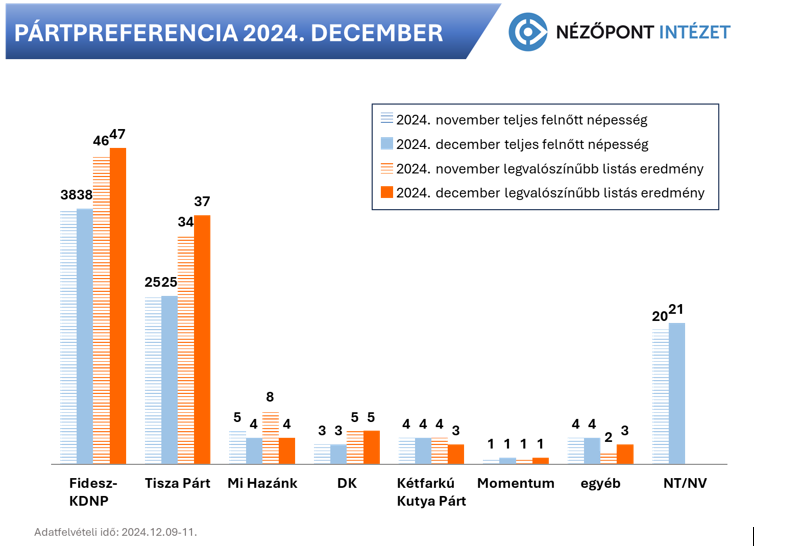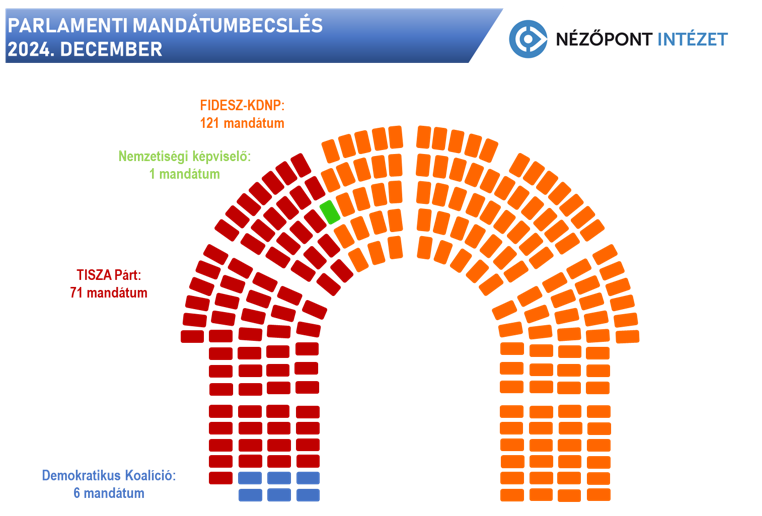According to the Nézőpont Institute's most likely list result estimate, Fidesz would win 47 percent of the list votes if an election were held “this Sunday”, while the Tisza Party would win 37 percent, which, according to the modelling based on the new constituencies, would result in a three-party parliament. A repeat victory for Fidesz would not be in question either: the governing parties would win 61 percent of all seats once again.
In December, 38 percent (2.9 million people) of the total adult population eligible to vote (about 7.67 million people) sympathised with Fidesz and 25 percent with the Tisza Party (1.9 million people), which is the same result as in the previous month.
Active voters who have confirmed their intention to participate in an election make up 73 percent of the eligible electorate (5.6 million), which is in line with the turnout trends seen in recent years' parliamentary elections. The Nézőpont Institute calculates the “most likely list results” based on the declared party preferences of active voters, using statistical methods to identify the party affiliations of undecided or hesitant respondents. Other institutes only report on declared party preferences, thus omitting the active group of voters who do not disclose their party preference, which can be estimated at 15-20 percent in surveys.

According to a survey conducted by the Nézőpont Institute in December, the most likely list result for Fidesz-KDNP would be 47 percent (2.6 million voters), for the Tisza Party 37 percent (2.1 million voters), while the DK list would receive 5 percent “if an election were held this Sunday”. All other parties, including Mi Hazánk (4 percent), which seems to be the loser of the month, and the Hungarian Two-Tailed Dog Party (3 percent) would also remain below the 5 percent threshold. The survey shows that polarisation has increased since November, and both Fidesz (+1 percentage point) and Tisza (+3 percentage points) have benefited from this. However, the gap between the two political parties remains significant at 10 percentage points. Since Péter Magyar avoids all interim elections, he can maintain his myth of victory among his supporters despite the figures.

The full picture also includes the fact that the percentages of the “most likely list result” are not the same as the distribution of parliamentary seats, as individual constituencies play a key role in the Hungarian electoral system. The Nézőpont Institute has therefore modelled how the distribution of seats would evolve “this Sunday” after a hypothetical parliamentary election, taking into account the historical voting trends at constituency level and the new constituency boundaries.
Based on the mandate estimate, Fidesz would win 74 individual constituencies and a total of 121 seats (61 percent of all mandates). The Tisza Party could win all the constituencies in Budapest, half of the constituencies in Pest County and constituencies of several county seats accounting for the remaining 32 individual constituencies, winning a total of 71 seats (36 percent of all mandates). The Democratic Coalition would win six seats, and one mandate would go to the ethnic German minority. Of course, the next 16 months could bring many more twists and turns, and every election result estimate works with several variables, but based on the above data, it can be stated that in an election held this Sunday, a Fidesz victory would be certain.
Methodology
The latest opinion-poll of the Nézőpont Institute was conducted between 9 and 11 of December, 2024, by interviewing 1,000 respondents by phone. For all surveys, the sample is representative of the adult population (18 years and older) by gender, age, region, type of settlement and education. In case of a sample size of 1000 respondents and a confidence level of 95 percent, the margin of sampling error is ± 3.16 percent. The data have been rounded to the nearest whole number, so their sum may not add up to exactly 100. The seat estimates are based on the most likely national list results of the parties, taking into account both the election history data and the new national constituency boundaries. For the votes cast by Hungarians abroad, the 2022 rates were taken into account.

